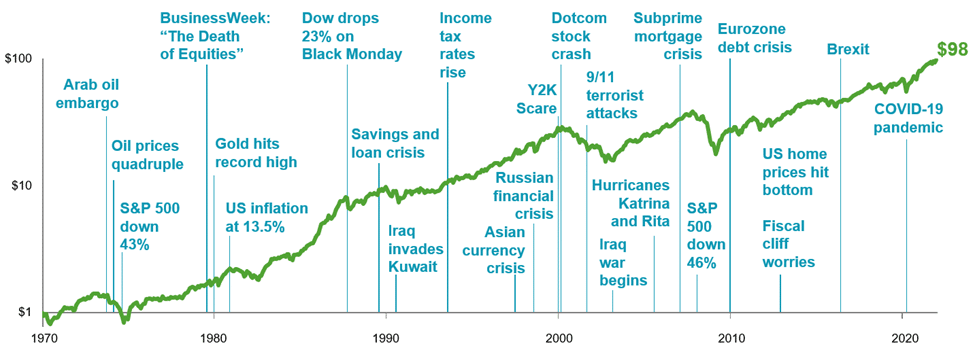Ben Franklin famously penned, “in this world nothing can be said to be certain, except death and taxes.” I would venture to guess that if he were around today, he would allow me to include stock market volatility as a third item on that list. But fortunately, unlike the other two examples, market volatility is typically short-lived and doesn’t have to be a permanent impediment to future success.
In fact, sudden changes in prices to reflect newly available information is normal and often the sign of a well-functioning market. If we think back to the most recent example of a large stock market decline in early 2020, the adjustment of prices downward as more and more information was learned about a novel virus spreading across the world was a reasonable response to what was massive uncertainty about how the global economy would fare. Similarly, the recovery in the broad market as economic support from governments and central banks was infused; scientists and doctors achieved incredible feats in a short period of time; and a global workforce demonstrated that entirely working from home could be a viable alternative to office life when necessary.
The market changes occurring recently are influenced by a variety of factors that are both interconnected and independent of one another. The war in Ukraine impacts supply chains and global economic flows which impacts the prices of goods and services (inflation) which informs monetary policy (interest rates) which impacts the prices of stocks and bonds, and on and on and around and around. If any one of the links of that chain were to be broken, there would likely be a positive impact elsewhere. When it comes to experiencing volatility, the reality is that it’s not a matter of if, but when.
In the chart below, we see a small snippet of just some of many events that have occurred where investors might have thought, ‘this time is different,’ and considered fleeing the stock (equity) markets, but if they had, they would have missed out on the growth that ensued.
Markets Have Rewarded Discipline
Growth of a dollar – MSCI World Index (new dividends) 1970-2021

Data represents past performance. Past performance is no guarantee of future results. Chart is for illustrative purposes only. Source: Dimensional Fund Advisors. In US dollars. MSCI data © MSCI 2022, all rights reserved. Indices are not available for direct investment. Their performance does not reflect the expenses associated with the management of an actual portfolio.
As we continue to experience stock market volatility and the complexity of interconnected events that are naturally causing uncertainty, here are three pieces of advice that can help you maintain your investment equilibrium:
- Be patient with yourself, your investments, and the world. You’re likely not interested in the exact value of your car or house on any specific day unless you’re about to sell them. You’re interested in the ability of your car to transport you; and your house to protect you, in addition to their long-term value as it relates to your broad financial picture. As it relates to your investments, the most important thing is not what the total value is on a given day, rather it is the ability to convert your investment portfolio efficiently (when needed) to provide you with the cashflow needed for your daily life, and its ability to position you favorably for your legacy goals. That is happening every day, regardless of the rise or fall in portfolio value.
- Avoid the headlines. This doesn’t mean burying your head in the sand and ignoring what’s happening in the world, rather it refers to avoiding the inflammatory language that is often used to sell papers or generate clicks. It’s avoiding language that is written to elicit emotion rather than support reason. When a particular company’s stock price has a (really) bad day and the news is seemingly everywhere, know that when your portfolio is well diversified such as yours is, the performance of any one company will not have an outsized effect. A disciplined investor looks past the headlines and present day events and instead focuses on the long-term potential growth of markets.
- Check in with yourself. If your emotions are running high with regard to market volatility, consider what might be behind your emotional response. Seek to ground yourself in historic market performance versus current volatility.
The world is in a different place than it was in 2020, and the drivers of the current bear market are different than they were then. The same is true for the bear markets of 2007-2009, 2000-2002, 1987, 1973-1974, and the more than a dozen that came before them. What has not changed is that for a diversified, disciplined investor who understands how their portfolio fits into a long-term financial plan, the future is bright.
The information provided in this article is intended for Carlson Retirement Plan Services plan participants. We recommend that individuals consult with a professional adviser familiar with their particular situation for advice concerning specific investment, accounting, tax, and legal matters before taking any action.
Please see additional IMPORTANT DISCLOSURE INFORMATION.
